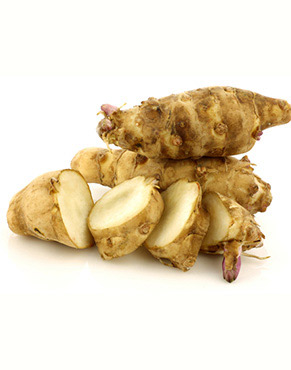How This Helps
Jerusalem Artichoke Health Benefits:
Diabetes | Gut health | Nervous system | Muscles | Heart | High Blood pressure | High cholesterol | Hair | | Antioxidation | Obesity | Bones | Cancers | Inflammation |
Jerusalem Artichoke (Helianthus tuberosus), is also known as sunchoke, sunroot, or topinambour, and is a species of the native sunflower. The name has no relation to Jerusalem. It is widely cultivated for its tubers that are rich in non-starchy carbohydrates inulin, which makes this tuber a very healthy food choice for people suffering from Diabetes Type 2.
Instructions
Jerusalem Artichoke is native to Northern and Central America
Jerusalem Artichoke Nutrition Facts:
Use It In
Pairs With
Jerusalem Artichokes pair best with other tubers like potatoes and sweet potatoes, ginger, garlic, lamb and turkey.
Caution
– Jerusalem Artichokes can obstruct the bile flow and result in the formation of gallstones. So people with liver and kidney problems should consume this tuber with care.
Science and Research
Diabetes:
Jerusalem Artichokes are one of the best sources of dietary fibers, especially oligofructose inulin, a non-starch soluble polysaccharide. Inulin is a no-calorie saccharine and is an inert carbohydrate that is not metabolized in the body. This makes it an ideal tuber for a person suffering from diabetics.
Gut:
The high amounts of dietary fibers help to retain moisture in the food, thus helping digestion and reducing constipation. Besides, Inulin stimulates the growth of the gut-friendly bacterium, bifidobacteria thereby, acting as an excellent prebiotic. This bacteria fights against the harmful bacteria in the intestines and boosts the immune system.
Additionally, the presence of Thiamine (Vitamin B1) in the tubers improves production of hydrochloric acid and carbohydrate metabolism in the stomach.
Heart:
Jerusalem Artichokes are a very rich source of minerals like iron, potassium, phosphorus, calcium and magnesium. They provide almost 42% of the dietary iron (per 100 g) and 9% of potassium supply. Iron helps in the production of red blood cells, whereas potassium reduces the blood pressure by countering the negative effects of sodium.







